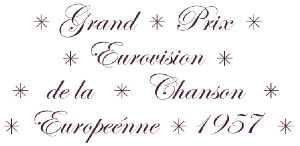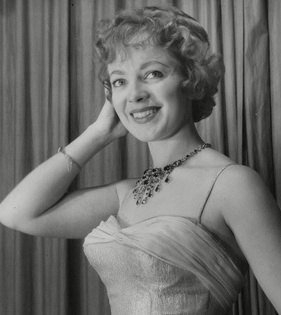
The Eurovision Song Contest 1957 was the second edition of the annual Eurovision Song Contest. Organised by the European Broadcasting Union (EBU) and host broadcaster Hessischer Rundfunk (HR) on behalf of ARD, the contest, originally known as the Grand Prix Eurovision de la Chanson Européenne 1957 was held on Sunday 3 March 1957 and was hosted at the Großer Sendesaal des hessischen Rundfunks in Frankfurt, West Germany by German actress Anaid Iplicjian.
The United Kingdom held a national pre-selection to choose the song that would go to the Eurovision Song Contest 1967. It was held on 25 February 1967 and presented by Rolf Harris. Harris's weekly show had been the showcase for the five songs in the competition, which had been performed in successive weeks prior to the final. Harris himself would be the BBC's commentator for the final in Vienna.
The United Kingdom participated in the Eurovision Song Contest 1960. The British Broadcasting Corporation (BBC) organised a national final, the Eurovision Song Contest British Final, to select the United Kingdom's entry for the contest. The United Kingdom was represented by the song "Looking High, High, High", performed by Bryan Johnson, and placed 2nd, the United Kingdom's joint best placing in the competition at the time.
The United Kingdom participated in the Eurovision Song Contest 1959. The British Broadcasting Corporation (BBC) organised a national final to select the United Kingdom's entry for the contest. The song selected was "Sing, Little Birdie", performed by Pearl Carr and Teddy Johnson. The song placed second in the contest, at the time the United Kingdom's best result in the competition, and remained so until their first victory in 1967.

Patricia Bredin was an English actress and one-time singer. She is best known as the first representative of the United Kingdom in the Eurovision Song Contest.

"Net als toen" is a love song written in Dutch by Willy van Hemert, composed by Guus Jansen and performed by Corry Brokken in 1957 as the Netherlands' entry and runaway winner of the pan-European Eurovision Song Contest, which gained other versions and popularity in several countries.

"Aprite le finestre" is an Italian song by Franca Raimondi. It won the sixth edition of the Sanremo Music Festival and subsequently was the first Italian entry in the Eurovision Song Contest 1956.

"Corde della mia chitarra" is an Italian song written by Giuseppe Fiorelli, composed by Mario Ruccione, and performed by Nunzio Gallo and Claudio Villa. The song is the winner of the Italian national Sanremo Music Festival 1957 where it was performed twice by the two singers and the Italian entry in the Eurovision Song Contest 1957. Both original recordings of the song are ranked among the top 100 most successful songs in Italy in 1957.
Germany competed at the Eurovision Song Contest 1969, held in Madrid, Spain. ARD, the German broadcaster, used a national final to select their entry.
Denmark took part in the Eurovision Song Contest for the first time at the Eurovision Song Contest 1957, held in Frankfurt, Germany. The Danish entry was chosen during a national final called Dansk Melodi Grand Prix.

Nunzio Gallo was an Italian singer. He was born in Naples and represented his country in the 1957 Eurovision Song Contest, coming 6th. The song he performed, "Corde Della Mia Chitarra", is famous for being the longest song ever played for Eurovision at 5:09 before the new rules came into place. Gallo was also an actor appearing in over 20 films. Gallo suffered severe brain haemorrhage in September 2007 from which he never fully recovered. He died on 22 February 2008 in Telese Terme.
The United Kingdom participated in the Eurovision Song Contest 2012 with the song "Love Will Set You Free" written by Martin Terefe and Sacha Skarbek. The song was performed by Engelbert Humperdinck, who was internally selected by the British broadcaster BBC to represent the United Kingdom at the 2012 contest in Baku, Azerbaijan. Humperdinck was announced as the British entrant on 1 March 2012, while the song "Love Will Set You Free" was presented to the public on 19 March 2012.
The United Kingdom participated in the Eurovision Song Contest 2013 with the song "Believe in Me" written by Desmond Child, Lauren Christy and Christopher Braide. The song was performed by Bonnie Tyler, who was internally selected by the British broadcaster BBC to represent the United Kingdom at the 2013 contest in Malmö, Sweden. Tyler and the song "Believe in Me" were announced as the British entry on 7 March 2013.
Latvia participated in the Eurovision Song Contest 2017 with the song "Line" written by Agnese Rakovska, Kristaps Ērglis and Kristians Rakovskis. The song was performed by the group Triana Park. The Latvian broadcaster Latvijas Televīzija (LTV) organized the national final Supernova 2017 in order to select the Latvian entry for the 2017 contest in Kyiv, Ukraine. 22 songs were selected to compete in the national final, which consisted of four shows: two heats, one semi-final and a final. In the heats and the semi-final, four entries were selected to advance from each show: two entries selected based on a public televote and two entries selected by a four-member jury panel. Four songs ultimately qualified to compete in the final on 26 February 2017 where a public vote exclusively selected "Line" performed by Triana Park as the winner.
Hungary participated in the Eurovision Song Contest 2017. The local Media Services and Support Trust Fund (MTVA) and the Hungarian broadcaster Duna Media Service organised the national final A Dal 2017 in order to select the Hungarian entry for the 2017 contest in Kyiv, Ukraine.
Hungary participated in the Eurovision Song Contest 2018. The local Media Services and Support Trust Fund (MTVA) and the Hungarian broadcaster Duna Media Service organised the national final A Dal 2018 in order to select the Hungarian entry for the 2018 contest in Lisbon, Portugal.
Hungary participated in the Eurovision Song Contest 2019. The local Media Services and Support Trust Fund (MTVA) and the Hungarian broadcaster Duna Media Service organised the national final A Dal2019 in order to select the Hungarian entry for the 2019 contest in Tel Aviv, Israel. As of 2023, this was Hungary's last entry in the contest, before the country withdrew the following year. The absence has continued in every edition since.
Lithuania originally planned to participate in the Eurovision Song Contest 2020 with the song "On Fire" written by Vaidotas Valiukevičius, Robertas Baranauskas and Mantas Banišauskas. The song was performed by the band The Roop. The Lithuanian broadcaster Lithuanian National Radio and Television (LRT) organised the national final Pabandom iš naujo! 2020 in order to select the Lithuanian entry for the 2020 contest in Rotterdam, Netherlands. The national final took place over six weeks and involved 36 competing entries. The results of each show were determined by the combination of votes from a jury panel and a public vote. In the final, eight artists and songs remained and "On Fire" performed by the Roop was selected as the winner.
The Sanremo Music Festival 1957, officially the 7th Italian Song Festival, was the seventh annual Sanremo Music Festival, held at the Sanremo Casino in Sanremo, province of Imperia between 7 and 9 February 1957. The show was presented by television presenter Nunzio Filogamo, assisted by Marisa Allasio, Fiorella Mari, Nicoletta Orsomando.
The Sanremo Music Festival 1956, officially the 6th Italian Song Festival, was the sixth annual Sanremo Music Festival, held at the Sanremo Casino in Sanremo, province of Imperia between 8 and 10 March 1956. The show was presented by actor Fausto Tommei, assisted by television announcer Maria Teresa Ruta.





